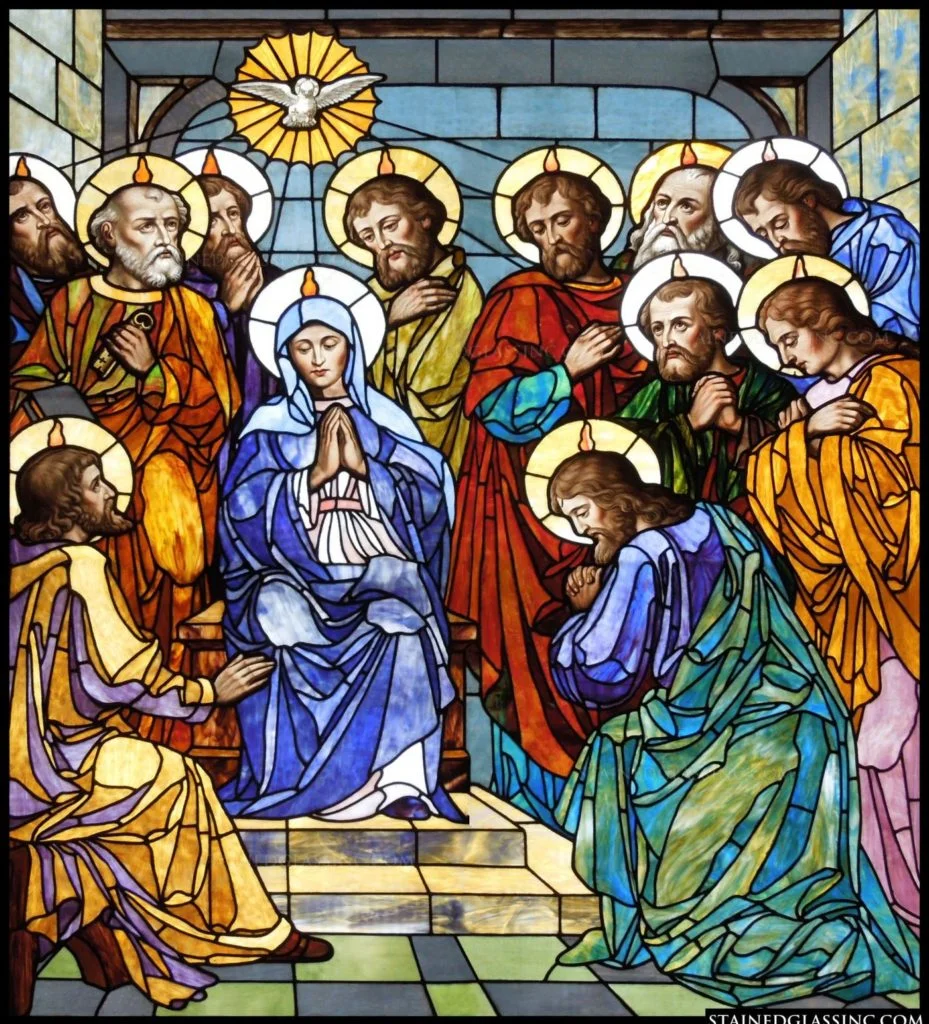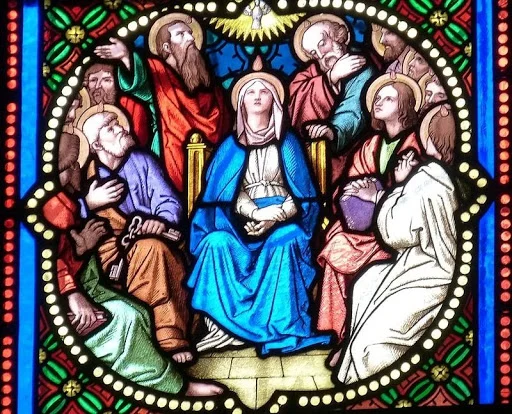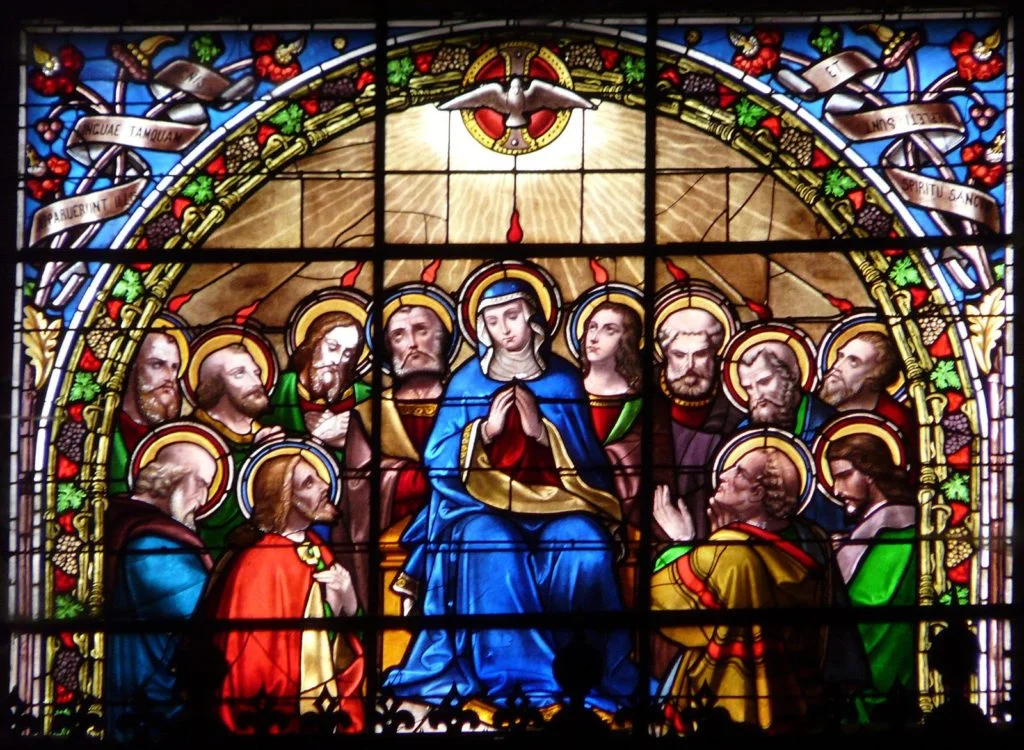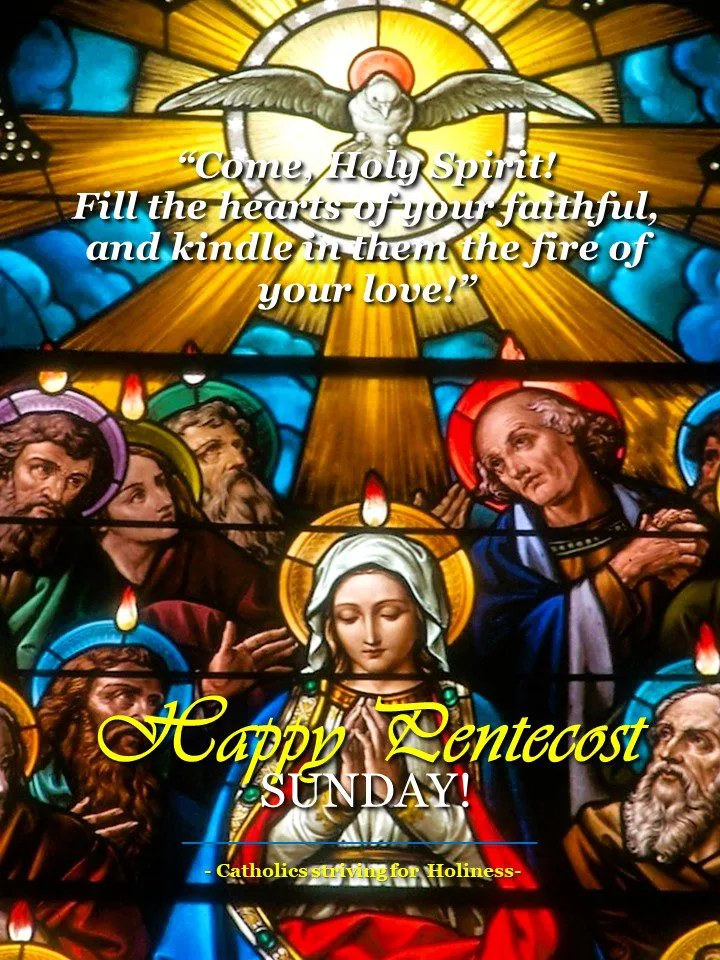POPE BENEDICT XVI ON PENTECOST

HOMILY OF HIS HOLINESS BENEDICT XVI
Vatican Basilica
Sunday, 27 May 2012
Dear Brothers and Sisters,
I am glad to celebrate this Holy Mass with you, enlivened today also by the Choir of the Academy of Santa Cecilia and by the Youth Orchestra — whom I thank — on the Solemnity of Pentecost. This mystery constitutes the Church’s baptism. It is an event which gave her, so to speak, her initial form and the drive for her mission. And this “form” and this “drive” are ever effective, ever present, and are renewed in a special way through the liturgical actions.
This morning I would like to reflect on an essential aspect of the Mystery of Pentecost which has preserved its full importance in our time. Pentecost is the feast of union, comprehension and human communion. We can all see that in our world, although we are increasingly close to one another with the development of the means of communication and geographical distances seem to be disappearing, understanding and communion between people is both superficial and problematic.
Imbalances endure that frequently lead to conflict; dialogue between the generations is heavy-going and at times antagonism prevails; we witness daily events in which it seems people are becoming more aggressive and more belligerent; understanding each other seems too demanding so they prefer to remain closed in on themselves, in their own interests. Can we truly find and live in this situation the unity we need?
The narrative of Pentecost in the Acts of the Apostles, which we heard in the First Reading (cf. Acts 2:1-11), contains against the background of one of the great frescoes we find at the beginning of the Old Testament: the ancient history of the construction of the Tower of Babel (Gen 11:1-9). But what is Babel? It is the description of a kingdom in which men had concentrated so much power that they thought they no longer needed to rely on a distant God and that they were powerful enough to be able to build a way to heaven by themselves in order to open its gates and usurp God’s place.
However, at this very moment something strange and unusual happens. While the men are working together to build the tower they suddenly realize that they are building against each other. While endeavouring to be like God, they even risk no longer being human because they have lost a fundamental element of being human: the ability to agree, to understand each other and to work together.
This biblical account contains a perennial truth; we can see it in history and in our world too. The progress of science and technology have enabled us to dominate the forces of nature, to manipulate the elements and to reproduce living beings, almost to the point of manufacturing the very human being. In this situation praying to God seems obsolete or pointless, because we ourselves can construct and achieve whatever we like.
Yet we do not realize that we are reliving the same experience as Babel. It is true, we have increased the possibility of communication, of obtaining information, of transmitting news, but can we say that our ability to understand each other has increased? Or, perhaps, paradoxically, do we understand each other less and less? Doesn’t a sense of mutual mistrust, suspicion and fear seem to be creeping in among human beings even to the point of making one individual dangerous to another? Let us therefore return to our initial question: can unity and harmony really exist? How?
We find the answer in Sacred Scripture: unity can only exist as a gift of God’s Spirit who will give us a new heart and a new language, a new ability to communicate. And this is what happened at Pentecost. On that morning, 50 days after Easter, a mighty wind blew through Jerusalem and the flame of the Holy Spirit came down upon the disciples gathered together. It settled on each one of them and kindled within them the divine fire, a fire of love capable of transforming them. Their fear evaporated, they felt their hearts filled with new strength, their tongues were loosened and they began to speak freely in such a way that everyone could understand the announcement that Jesus Christ had died and was risen. At Pentecost, where there had been division and alienation, unity and understanding were born.
However, let us look at today’s Gospel in which Jesus says: “When the Spirit of truth comes, he will guide you into all the truth” (Jn 16:13). Here, in speaking of the Holy Spirit, Jesus explains to us what the Church is and how she should live in order to be herself, to be the place of unity and communion in Truth; he tells us that behaving as Christians means no longer being shut into our own “I” but rather being open to all things: it means inwardly welcoming the whole Church within ourselves or, even better, inwardly letting her receive us. Therefore when I speak, think and act as a Christian I do not do so by closing myself into myself, but I always do so in all things and starting with all things: thus the Holy Spirit, the Spirit of unity and of truth, may continue to resonate in our human hearts and minds and spur people to meet and to welcome each other.
Precisely because the Spirit acts in this way, he ushers us into the whole truth, which is Jesus, and guides us to look at it more deeply and to understand it. We do not grow in knowledge by locking ourselves into own ego but only in an attitude of profound inner humility do we become capable of listening and sharing in the “we” of the Church. And in this way it becomes clearer why Babel is Babel and Pentecost is Pentecost. Wherever people want to set themselves up as God they cannot but set themselves against each other. Instead, wherever they place themselves in the Lord’s truth they are open to the action of his Spirit who sustains and unites them.
The comparison of Babel with Pentecost is re-echoed once again in the Second Reading where the Apostle says: “Walk by the Spirit, and do not gratify the desires of the flesh” (Gal 5:16). St Paul explains to us that our personal life is marked by an inner conflict, a rupture between the impulses that come from the flesh and those that come from the Spirit; and we cannot follow them all. Indeed, we cannot be both selfish and generous, follow the tendency to dominate others and at the same time feel the joy of disinterested service. We always have to choose which impulse to follow and we can do so authentically only with the help of the Spirit of Christ.
St Paul — as we have heard — lists the works of the flesh. They are the sins of selfishness and violence, enmity, discord, jealousy and disagreement; they are thoughts and actions that do not let us live in a truly human and Christian way, in love. This direction leads to the loss of one’s own life. The Holy Spirit on the contrary leads us to the heights of God, so that we may already experience on this earth the seed of divine life which exists within us. St Paul says in fact: “the fruit of the Spirit is love, joy, peace…” (Gal 5:22).
And let us note that the Apostle uses the plural to describe the works of the flesh that cause us to lose our humanity, whereas he uses the singular to define the Spirit’s action, he speaks of “fruit”, just as the scattering abroad at Babel is contrasted with the unity of Pentecost.
Dear friends, we must live in accordance with the Spirit of unity and truth and this is why we should pray that the Spirit illuminate and guide us so that we may overcome our fascination with following our own truths and receive the truth of Christ, passed on in the Church. Luke’s account of Pentecost tells us that before ascending into heaven Jesus asked the Apostles to stay together to prepare themselves to receive the gift of the Holy Spirit. And they assembled in prayer with Mary in the Upper Room to await the promised event (cf. Acts 1:14). Gathered with Mary, as at her birth, today too the Church prays: “Veni Sancte Spiritus! — Come Holy Spirit, fill the hearts of your faithful and kindle in them the fire of your love!”. Amen.
© Copyright 2012 – Libreria Editrice Vaticana http://www.vatican.va/content/benedict-xvi/en/homilies/2012/documents/hf_ben-xvi_hom_20120527_pentecoste.html
EMPHASIS MINE.

HOMILY OF HIS HOLINESS BENEDICT XVI
Vatican Basilica
Sunday, 31 May 2009
Dear Brothers and Sisters,
Every time we celebrate the Eucharist we live in faith the mystery that is fulfilled on the altar, that is, we take part in the supreme act of love that Christ accomplished with his death and Resurrection. The one and only centre of the liturgy and Christian life itself the Paschal Mystery acquires in the various Solemnities and Feasts specific “forms”, with additional meanings and special gifts of grace. Pentecost is distinguished from all the Solemnities by its importance since what Jesus himself had announced as the purpose of the whole of his mission on earth is brought about in it. Indeed, on his way up to Jerusalem he had declared to his disciples: “I came to cast fire upon the earth; and would that it were already kindled!” (Lk 12: 49). These words were most visibly brought about 50 days after the Resurrection, at Pentecost, the ancient Jewish feast which in the Church has become the feast par excellence of the Holy Spirit: “There appeared to them tongues as of fire… and they were all filled with the Holy Spirit” (Acts 2: 3-4). The real fire, the Holy Spirit, was brought to the earth by Christ. He did not steal it from the gods like Prometheus, according to the Greek myth, but rather made himself the mediator of the “gift of God”, obtaining it for us with the greatest act of love in history: his death on the Cross.
God wants to continue giving this “fire” to every human generation and he is naturally free to do so as and when he wishes. He is spirit, and the Spirit “blows where he wills” (cf. Jn 3: 8). However, there is a “normal way” which God himself chose “to cast fire upon the earth”: this way is Jesus, his Only-Begotten Son, incarnate, dead and Risen. In his turn Jesus Christ constituted the Church as his Mystical Body so that she might extend his mission in history. “Receive the Holy Spirit”, the Lord said to the Apostles on the evening of the Resurrection, accompanying these words with an expressive gesture: “he breathed” on them (cf. Jn 20: 22). In this way he showed that he was communicating his Spirit to them, the Spirit of the Father and of the Son. Now, dear brothers and sisters, in today’s Solemnity Scripture tells us once again how the community should be, how we should be in order to receive the gift of the Holy Spirit. In the account which describes the event of Pentecost, the sacred Author recalls that the disciples “were all together in one place”. This “place” was the Cenacle, the “Upper Room” where Jesus had eaten the Last Supper with his Apostles, where he had appeared to them risen; that room which had become, so to speak, the “headquarters” of the nascent Church (cf. Acts 1: 13). The Acts of the Apostles, however, rather than insisting on the physical place, intend to point out the inner attitude of the disciples: “All these with one accord devoted themselves to prayer” (Acts 1: 14). Harmony among the disciples is thus the condition for the coming of the Holy Spirit; and a presupposition of harmony is prayer.
Dear brothers and sisters, this also applies to the Church today, it applies to us, who are gathered here. If we want to prevent Pentecost from being reduced to a mere rite or even an evocative commemoration but want it to be an actual event of salvation, we must prepare ourselves in devout expectation for the gift of God through humble and silent listening to his Word. Since Pentecost is renewed in our time, perhaps taking nothing from the freedom of God the Church should concentrate less on activities and be more dedicated to prayer. The Mother of the Church, Mary Most Holy, Bride of the Holy Spirit, teaches us this. This year Pentecost falls on the very last day of May on which the Feast of the Visitation is normally celebrated. That too was a sort of miniature “pentecost” which caused joy and praise to well up in the hearts of Elizabeth and Mary, one barren and the other a virgin, who both became mothers through an extraordinary divine intervention (cf. Lk 1: 41-45). The music and singing that accompany this liturgy help us likewise to be with one accord devoted to prayer, and for this I express my deep gratitude to the Cathedral Choir and the Kammerorchester of Cologne. Joseph Haydn’s Harmoniemesse has very appropriately been chosen for this liturgy on the bicentenary of his death, the last of the “Masses” composed by the great musician and a sublime symphony to the glory of God. I address my most cordial greeting to all of you who are gathered here on this occasion.
In the account of Pentecost the Acts of the Apostles uses two important images to indicate the Holy Spirit: the image of the storm and the image of fire. Clearly, St Luke has in mind the theophany of Sinai, recounted in the Books of Exodus (19: 16-19) and Deuteronomy (4: 10-12, 36). In the ancient world the storm was seen as a sign of divine power, before which man felt subjugated and terrified. However, I would like to emphasize another aspect too: the storm is described as a “mighty wind” and this makes one think of the air which distinguishes our planet from the other stars and enables us to live on it. What air is for biological life, the Holy Spirit is for spiritual life; and just as an atmospheric pollution exists that poisons the environment and living beings, thus a pollution of heart and spirit exists that mortifies and poisons spiritual life. In the same way that one must not become inured to the poisons in the air and for this reason ecological commitment is a priority today likewise one must not become inured to what corrupts the mind. On the other hand it seems that it is not difficult to become accustomed to the many products that contaminate both the mind and the heart and that circulate in our society for example, images which boost pleasure, violence or contempt for men and women. This is also freedom, people say, without realizing that all this pollutes, and intoxicates the mind, especially that of the new generations and moreover ends by conditioning their very freedom. The metaphor of the mighty wind of Pentecost makes one think instead of how precious it is to breathe clean air, physically with the lungs and spiritually with the heart, the healthy air of the Spirit who is love!
The other image of the Holy Spirit which we find in the Acts of the Apostles is fire. I mentioned at the beginning the comparison between Jesus and the mythological figure of Prometheus which recalls a characteristic aspect of modern man. In possessing himself of the energies of the cosmos “fire” the human being seems today to assert himself as a god and to wish to transform the world excluding, setting aside or even rejecting the Creator of the universe. Man no longer wants to be an image of God but of himself; he declares himself autonomous, free and adult. Of course, this attitude reveals a relationship with God which is not authentic, the consequence of a false image which has been fabricated of him, like the Prodigal Son in the Gospel parable who believes that he can fulfil himself by distancing himself from his father’s house. In the hands of such a man “fire” and its enormous potential become dangerous: they can backfire against life and humanity itself, as history unfortunately shows. The tragedies of Hiroshima and Nagasaki, where atomic energy used for the purposes of war, ended by sowing death on an unheard of scale, serve as a perennial warning.
It would truly be possible to find many examples, less grave but equally symptomatic, in everyday reality. Sacred Scripture reveals to us that the energy capable of moving the world is not an anonymous and blind force but the action of the “Spirit of God… moving over the face of the waters” (Gn 1: 2) at the beginning of the Creation. And Jesus Christ “brought to the earth” not the vital force that already lived in it but the Holy Spirit, that is, the love of God who “renews the face of the earth”, purifying it from evil and setting it free from the dominion of death (cf. Ps 103[104]: 29-30). This pure, essential and personal “fire”, the fire of love, came down upon the Apostles gathered in prayer with Mary in the Upper Room, to make the Church an extension of Christ’s work of renewal.
Lastly, a final thought may also be found in the account of the Acts of the Apostles: the Holy Spirit overcomes fear. We know that the disciples sought shelter in the Upper Room after the arrest of their Lord and that they had remained isolated for fear of suffering the same fate. After Jesus’ Resurrection their fear was not suddenly dispelled. But here at Pentecost, when the Holy Spirit rested upon them, those men emerged fearless and began to proclaim the Good News of the Crucified and Risen Christ to all. They were not afraid because they felt they were in the hands of the strongest One. Yes, dear brothers and sisters, wherever the Spirit of God enters he puts fear to flight; he makes us know and feel that we are in the hands of an Omnipotence of love: something happens, his infinite love does not abandon us. It is demonstrated by the witness of martyrs, by the courage of confessors of the faith, by the undaunted zeal of missionaries, by the frankness of preachers, by the example of all the saints, even some who were adolescents and children. It is demonstrated by the very existence of the Church which, despite the limitations and sins of men and women, continues to cross the ocean of history, blown by the breath of God and enlivened by his purifying fire. With this faith and joyful hope let us repeat today, through the intercession of Mary: “Send forth your Spirit, O Lord, and renew the face of the earth”.
© Copyright 2009 – Libreria Editrice Vaticana http://www.vatican.va/content/benedict-xvi/en/homilies/2009/documents/hf_ben-xvi_hom_20090531_pentecoste.html
EMPHASIS MINE.

HOMILY OF HIS HOLINESS BENEDICT XVI
Vatican Basilica
Sunday, 4 June 2006
Dear Brothers and Sisters,
On the day of Pentecost, the Holy Spirit descended with power upon the Apostles; thus began the mission of the Church in the world.
Jesus himself prepared the Eleven for this mission, appearing to them on many occasions after his Resurrection (cf. Acts 1: 3).
Prior to the Ascension into Heaven, he ordered them “not to depart from Jerusalem, but to wait for the promise of the Father” (cf. Acts 1: 4-5); that is, he asked them to stay together to prepare themselves to receive the gift of the Holy Spirit. And they gathered in prayer with Mary in the Upper Room, awaiting the promised event (cf. Acts 1: 14).
To stay together was the condition laid down by Jesus in order to receive the gift of the Holy Spirit; the premise of their harmony was prolonged prayer. In this way we are offered a formidable lesson for every Christian community.
Some think at times that missionary effectiveness depends primarily on careful programming and its subsequent intelligent application through a concrete commitment.
The Lord certainly does ask for our collaboration, but before any other response his initiative is necessary: his Spirit is the true protagonist of the Church. The roots of our being and of our action are in the wise and provident silence of God.
The images used by St Luke to indicate the outpouring of the Holy Spirit – wind and fire – recall Sinai, where God revealed himself to the people of Israel and offered his covenant (cf. Ex 19: 3ff.). The feast of Sinai, which Israel celebrated 50 days after the Passover, was the feast of the Covenant.
Speaking of the tongues of fire (cf. Acts 2: 3), St Luke wants to show Pentecost as a new Sinai, as the feast of the New Covenant, where the Covenant with Israel is extended to all the nations of the earth.
The Church has been catholic and missionary from her birth. The universality of salvation is meaningfully manifested with the list of the numerous ethnic groups to which those who heard the Apostles’ first proclamation belonged (cf. Acts 2: 9-11).
The People of God, which had found its first configuration in Sinai, extends today to the point of surmounting every barrier of race, culture, space and time. As opposed to what occurred with the tower of Babel (cf. Gn 11: 1-9), when people wanted to build a way to heaven with their hands and ended up by destroying their very capacity of mutual understanding, in Pentecost the Spirit, with the gift of tongues, demonstrates that his presence unites and transforms confusion into communion.
Human pride and egoism always create divisions, build walls of indifference, hate and violence. The Holy Spirit, on the other hand, makes hearts capable of understanding the languages of all, as he re-establishes the bridge of authentic communion between earth and heaven. The Holy Spirit is Love.
But how is it possible to enter into the mystery of the Holy Spirit? How can the secret of Love be understood?
The Gospel passage takes us today to the Upper Room where, after the Last Supper, a sense of loss has saddened the Apostles. This is due to the fact that Jesus’ words arouse disturbing questions: He spoke of the world’s hatred of him and of his own, he spoke of his mysterious departure; and there were still many other things to be said, but for the time being the Apostles were not able to bear the weight (cf. Jn 16: 12).
To console them, he explains the meaning of his departure: he will go, but he will return; meanwhile, he will not abandon them, will not leave them orphans. He will send the Consoler, the Spirit of the Father, and the Spirit will enable them to understand that Christ’s work is a work of love: love of the One who gave himself, love of the Father who has given him.
This is the mystery of Pentecost: the Holy Spirit illuminates the human spirit and, by revealing Christ Crucified and Risen, indicates the way to become more like him, that is, to be “the image and instrument of the love which flows from Christ” (Deus Caritas Est, n. 33).
The Church, gathered with Mary as at her birth, today implores: “Veni, Sancte Spiritus! – Come, Holy Spirit, fill the hearts of your faithful and kindle in them the fire of your love!”. Amen.
© Copyright 2006 – Libreria Editrice Vaticana http://www.vatican.va/content/benedict-xvi/en/homilies/2006/documents/hf_ben-xvi_hom_20060604_pentecoste.html
EMPHASIS MINE.
Stay updated: subscribe by email for free TO OUR NEW WEBSITE www.catholicsstrivingforholiness.org (PUT YOUR EMAIL IN THE SUBSCRIBE WIDGET).
We are also in www.fb.com/Catholicsstrivingforholiness. Kindly help more people in their Christian life by liking our page and inviting your family, friends and relatives to do so as well. Thanks in advance and God bless you and your loved ones! Fr. Rolly Arjonillo


